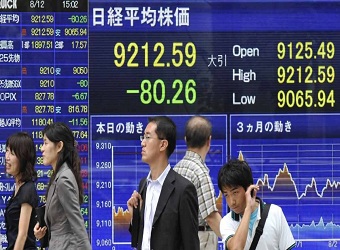Asian indexes were mostly lower on Wednesday following the rally on Wall Street overnight while the dollar lost ground following comments from President Donald Trump.
Japan’s Nikkei 225 rose 0.31 percent to end a five-day losing streak.
Across the Korean strait, the Kospi was mostly flat, trading higher by 0.02 percent.
Down Under, the S&P/ASX 200 gave up gains made earlier in the session. The index slid 0.17 percent, as a rise in the energy sub-index was offset by losses in the utilities and information technology sub-indexes.
Mainland China markets also edged down. The Shanghai Composite slipped 0.21 percent and the Shenzhen Composite declined 0.338 percent.
Meanwhile, trade for Hong Kong markets was cancelled as tropical cyclone Hato approached, the Hong Kong Exchange said in a news release. A number of ten typhoon signal, the most severe in the Hong Kong warning system, was issued by the Hong Kong Observatory at 9:10 a.m. HK/SIN.
The dollar fell against the yen after Trump on Wednesday warned of a government shutdown if he didn’t get to build a proposed border wall with Mexico.
Trump’s comments sent the safe-haven yen higher, with the dollar fetching as little as 109.34 yen, compared with as high as 109.82 yen prior to Trump’s remarks. The dollar/yen was at 109.45 at 12:14 p.m. HK/SIN.
Meanwhile, spot gold bumped higher, rising as high as $1,286.72 an ounce after the remarks from as low as $1,282.94 earlier. The yellow metal was at $1,285.48 at 12:16 p.m. HK/SIN.
The dollar index slipped as low as 93.468 on the headlines after climbing against a basket of currencies earlier in the session. The dollar index recovered some ground to stand at 93.514 at 12:10 p.m. HK/SIN.
The move higher overnight on Wall Street was attributed to talk that the Trump administration was moving ahead with its tax reform policy proposals.
Trump aides and congressional leaders were reportedly in broad agreement over how corporate and individual tax rates could be reduced, according to a Politico report.
Stateside, stocks ended the session higher as investors anticipated progress on tax reform, with the Dow Jones industrial average rising 0.90 percent, or 196.14 points, to close at 21,899.89.
“This is in essence a shrug (of relief) rather than a bona fide surge in risk appetite,” said Mizuho Bank Head of Economics and Strategy Vishnu Varathan in a note.
Despite the pick-up in risk appetite overnight, market sentiment remained rather fickle, ANZ Research said in a Wednesday note.
“Sentiment is yo-yoing in thin summer markets ahead of the Jackson Hole symposium,” wrote ANZ economist Giulia Lavinia Specchia.
Market movers during the day included Toshiba, which has started talks with Western Digital as it attempts to secure an agreement for the sale of its flash memory arm, Nikkei Asian Review reported. Toshiba shares rose 5.30 percent.
In corporate news, China Unicom’s Hong Kong unit entered into a share subscription agreement with Unicom BVI, according to a release on the Hong Kong Exchange. Unicom BVI, controlling shareholder of China Unicom Hong Kong, will subscribe for a maximum of 6.65 billion subscription shares at a price of HK$13.24 per share.
In economic news, Indonesia’s central bank lowered its benchmark interest rate by 25 basis points to 4.5 percent in a surprise move. A Reuters poll had found that 19 out of 20 economists surveyed had expected rates to remain on hold. The rate cut was Bank Indonesia’s first since October.
Meanwhile, oil prices slipped after climbing overnight. Brent crude futures declined 0.23 percent to trade at $51.75 a barrel and U.S. crude futures shed 0.21 percent to trade at $47.73.
In currencies, the euro traded at $1.1758 at 12:19 p.m. HK/SIN, just above an overnight low of $1.1756 against the dollar. The move lower in the euro was attributed to softer-than-expected economic sentiment in Germany. German institute ZEW said its investor sentiment index showed a fall to 10.0 from 17.5 in July, according to Reuters.
The softer euro was also due to nervousness over how hawkish European Central Bank President Mario Draghi will sound in his speech at Jackson Hole, given how much the common currency has appreciated this year, BK Asset Management Managing Director of FX Strategy Kathy Lien said in a note.
The central banking meeting at Jackson Hole will take place at the end of the week.
Source: CNBC


